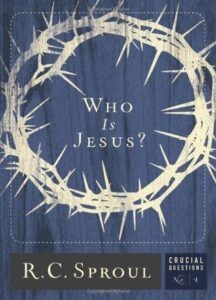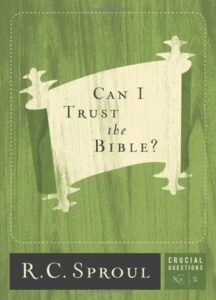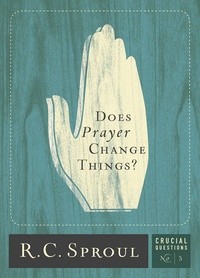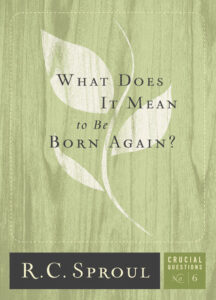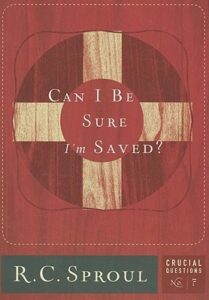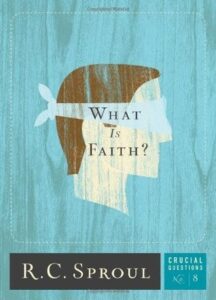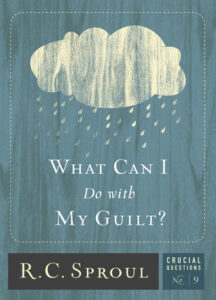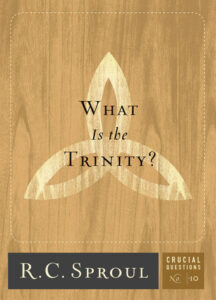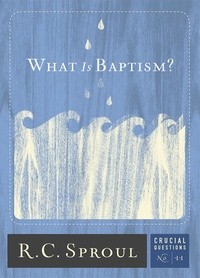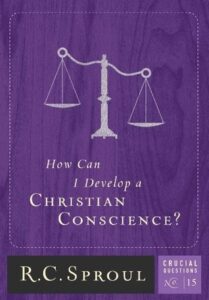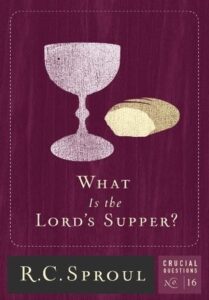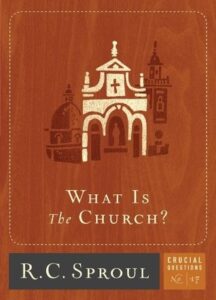
In an attempt to help Christians know what they believe, why they believe it, how to live it, and how to share it, Dr. R. C. Sproul has released a series of introductory theological booklets to provide a quick overview of core Christian doctrine. These writings are perfect for personal study and devotion, however, they would also work extremely well for small-group study.
These current volumes –– 17 in all –– cover matters such as the nature of God, the history of redemption, assurance of salvation, prayer, guilt, and the Lord’s Supper.
The Crucial Questions series is available for $29.90.
To get this entire series absolutely free, just purchase $30 worth of any other Ligonier Ministries products, add the Crucial Questions product to your cart, and use coupon code CruQFree at checkout.
![]() Who is Jesus?
Who is Jesus?
No person in history has provoked such widely divergent assessments as Jesus of Nazareth. Some say He was a cunning fraud, while others say He must have been out of His mind. In many cases His story is altered to suit the fancies of those seeking to make Him an ally for a host of militant causes.
However, as Sproul points out in Who is Jesus?, there is compelling evidence that Jesus was something more-that He was, in fact, God in the flesh. By wrestling with the biblical titles for Jesus and the accounts of His life and ministry, Sproul unfolds the scriptural portrait of Jesus, the Son of God.
![]() Can I Trust the Bible?
Can I Trust the Bible?
There is a common assumption that the Bible is full of errors and contradictions, and that its often-unusual people and events render it useless for today. These ideas are fueled by the teachings of scholarly critics, who seem to delight in raising questions about the Bible’s truthfulness and integrity.
But, according to Sproul, the critics of the Bible are wrong. In fact, he says, there are many solid reasons to trust the Bible. With Jesus, with the apostles and prophets, and with men of God throughout church history, Sproul affirms a high view of Scripture–that it is inspired of God and therefore inerrant and infallible.
![]() Does Prayer Change Things?
Does Prayer Change Things?
Does prayer make any difference? Does it really change anything? Sproul says yes. Though we cannot hope that our prayers will change God’s mind, prevailing upon Him to act against His will, we can be sure that prayer does change things including our own hearts. Plus, it is one of the chief means by which God carries out His will in the world.
For these reasons, Sproul argues, prayer has a vital place in the life of the Christian. In short chapters packed with practical wisdom, he unveils the purpose, the pattern, the practice, the prohibitions, and the power of prayer, calling Christians to come before God’s presence with joy and hope.
![]() Can I Know God’s Will?
Can I Know God’s Will?
As human beings, we long to know that our lives will unfold in ways that we will find pleasant and rewarding. As Christians, we have a different focus-we want our lives to be pleasing to God. Thus, we ponder His will and worry that we are not doing what He wants us to do.
In this volume, Sproul outlines timeless principles for discovering and applying the will of God in day-to-day decisions. He then illustrates how these principles should inform two of the most significant decisions we face in life–the choice of a career and the choice of a spouse. Here is valuable guidance for those who are passionate to follow God.
![]() How Should I Live in this World?
How Should I Live in this World?
Christians want to do the right thing. But it can be tough to know what the right thing is. Plus, it’s not just the big questions with which we must wrestle–ethical dilemmas confront us each day in every aspect of life. On what basis do we make all of these decisions?
Sproul argues that the Bible is the supreme source for ethical guidance. That doesn’t mean it contains a Thou shalt . . . or a Thou shalt not . . . for every conceivable situation, but it does provide ethical principles. With his trademark wisdom and thoroughness, Dr. Sproul explains how we can uncover and apply these principles.
![]() What Does it Mean to be Born Again?
What Does it Mean to be Born Again?
When Jesus explained the necessity of the new birth, the Jewish leader Nicodemus asked in astonishment, “How can these things be?” Some two thousand years later, much confusion still surrounds the term “born again,” though more people than ever claim to have had the experience.
This volume cuts through the confusion and carefully explains what it means, biblically and theologically, to be born again. He affirms, first of all, that Jesus wasn’t kidding—new birth is essential—then goes on to show what the new birth is and how it occurs. His clear teaching will provide understanding for those who are unfamiliar with the new birth and deeper assurance for those who may not know where they stand with God.
![]() Can I Be Sure I’m Saved?
Can I Be Sure I’m Saved?
Many people in the church today are plagued by doubts about their salvation. Satan whispers that it is impossible that sinners such as they could be in a state of grace, and some churches compound the problem by teaching that it is possible for believers to lose their salvation.
But assurance of salvation is possible in this life. Indeed, it is the duty of Christians to make their calling sure (2 Peter 1:10). To help believers reach this goal, Dr. Sproul defines assurance, shows how we can get it, reveals the blessings it confers, and warns of the dangers of false assurance. Here is assistance for those who struggle to know where they stand with Jesus Christ.
![]() What is Faith?
What is Faith?
The word faith is heard often these days, but it is given many different meanings. Sometimes it is used in the sense of trust. Other times, it has more to do with hope. Perhaps most often, it is used to mean belief in something apart from rational or empirical support.
Because faith is central to the Christian life, believers must have a clear understanding of how the Bible defines the word and the concept. Sproul looks to Hebrews 11, the great faith chapter of the Bible, for a definition of faith and numerous examples of it in the lives of the saints. He shows that faith, in scriptural terms, is not believing in God but believing God and living according to His Word. Armed with this helpful teaching, readers will gain clarity as to whether the faith they profess is the genuine article.
![]() What Can I Do with My Guilt?
What Can I Do with My Guilt?
Dr. R. C. Sproul has often used the question above to confront unbelievers who deny their need for a Savior. The question often breaks through sinful complacency, because feelings of guilt over sin are common. Unbelievers may ignore their sense of guilt, rationalize it, or desensitize it, but it is there. It points to the fact that all people are objectively guilty before God.
So what must we do with our guilt? God can use our feelings of guilt to reveal our true guilt in His sight. He then prescribes the only remedy–the forgiveness that God has provided through Jesus Christ. Here is solid biblical counsel for those who hear the accusations of their consciences.
![]() What is the Trinity?
What is the Trinity?
The Trinity is truly a mystery. This doctrine teaches that the God of Christianity is one in His essence but three in His persons–the Father, the Son, and the Holy Spirit. Though the word Trinity is not found in the Bible, there is no doubt that the Scriptures teach this triune nature of God. Yet the concept still challenges our finite minds.
Sproul carefully explains the doctrine of the Trinity, stressing that Christians worship one God who manifests Himself in three distinct persons. He shows what the Bible teaches and outlines the chief errors on this doctrine that have afflicted the church. Above all, he affirms that while this truth is difficult to understand, it is not contradictory. Rather, it is a beautiful expression of the biblical teaching on the nature of God.
![]() What is Baptism?
What is Baptism?
Baptism is taught in the Bible and has been practiced for centuries, but understanding of its meaning and respect for its importance is at a low ebb today. Confusion reigns over questions about its mode and its place in the life of the Christian, and as a result, even many evangelical congregations are downplaying its significance.
Sproul posits that this is not the way it should be. Baptism, he affirms, is one of the two sacraments of the Christian church, a sign and seal of the covenant of grace. Therefore, it is a necessary and meaningful practice that is packed with rich symbolism.
![]() Can I Have Joy in My Life?
Can I Have Joy in My Life?
Joy is a popular topic in Western culture today. Books explain how to find joy in a wide variety of activities. We speak of “joyous” occasions such as weddings and births. We sing about “Joy to the World” at Christmas. “Joy” remains a popular name for girls. But given the extent to which joy seems to be on our minds, few people seem to have it or even know what it is.
This volume cuts through the confusion surrounding this popular but misunderstood attribute, showing the one sure path to deep, lasting joy—a relationship with God through Jesus Christ. By abiding in Christ, we may experience fullness of joy—a joy that transcends unhappy circumstances and even permits us to rejoice with others because of the blessed hope Christ provides.
![]() Who is the Holy Spirit?
Who is the Holy Spirit?
The topic of the Holy Spirit sparks much interest these days, but also much confusion. Thanks to extra-biblical assertions about the Spirit’s person and work, ideas abound as to who the Spirit truly is, how He operates in time and space, and what precisely He does.
Cut through the confusion by going back to the Bible. Sproul establishes the biblical teaching on the Spirit’s identity—He is one of the three persons of the Godhead, along with the Father and Son—then briefly sketches some of the most basic yet important roles the Spirit carries out. He shows that the Spirit gives new life to unbelievers, then sanctifies, strengthens, teaches, and anoints them for ministry. This booklet provides a basic understanding of the divine person on whom Christians’ very lives depend.
![]() Does God Control Everything?
Does God Control Everything?
Most people today believe that we live in a closed, mechanistic universe, that is, a universe that functions from day to day according to certain physical forces and causes. Classical Christianity has taken a very different view, teaching that God is the primary cause of the universe, but also that He is the primary cause of everything in the universe and of everything that happens in the universe—in short, that God, not mechanistic forces, is the primary cause of what is and what happens.
Sproul explores and explains the Christian doctrine of providence, the teaching that God is the sovereign ruler of the universe. He then deals with some of the philosophical and theological questions and objections the doctrine raises. His teaching challenges popular assumptions about the universe and exalts God as the sovereign ruler and sustainer of all things.
![]() How Can I Develop a Christian Conscience?
How Can I Develop a Christian Conscience?
In this volume, Sproul shows that this development involves learning and mastering the many principles God has laid down in His Word, and even in creation itself. In other words, we must know and understand God’s law. As we gain a firmer grasp of what God expects and requires, we are increasingly able to make decisions that please Him.
![]() What is the Lord’s Supper?
What is the Lord’s Supper?
This volume cuts through the confusion to define the supper, demonstrate what it means, and show how important it is for the lives of believers and churches. The author explores the origins of the supper, explains what it does for us, and refutes erroneous views of the Sacrament. Here is teaching that will enhance any reader’s appreciation for the work of Christ that is pictured in the bread and wine.
![]() What is the Church?
What is the Church?
The church is a body of people saved by Jesus Christ and regenerated by the Holy Spirit who live to glorify and enjoy God. Beginning with the ancient Nicene Creed, which affirms that the church is “one, holy, catholic, and apostolic,” Sproul provides accessible teaching on one of the most misunderstood of all Christian doctrines.


